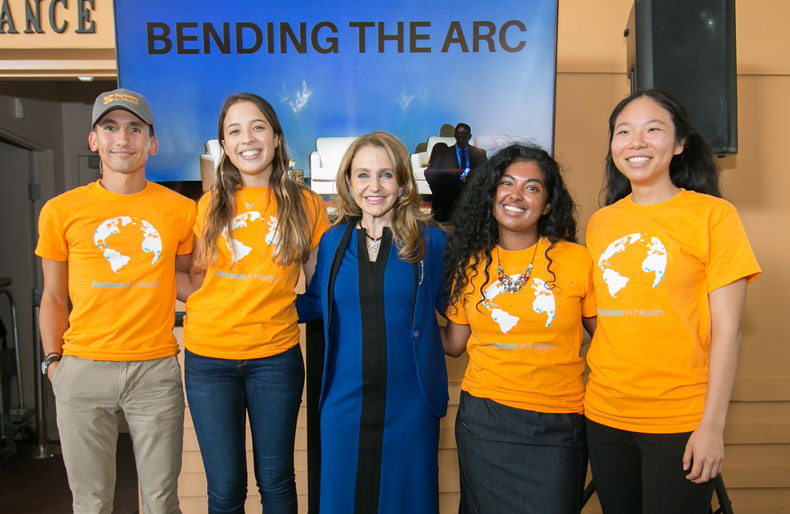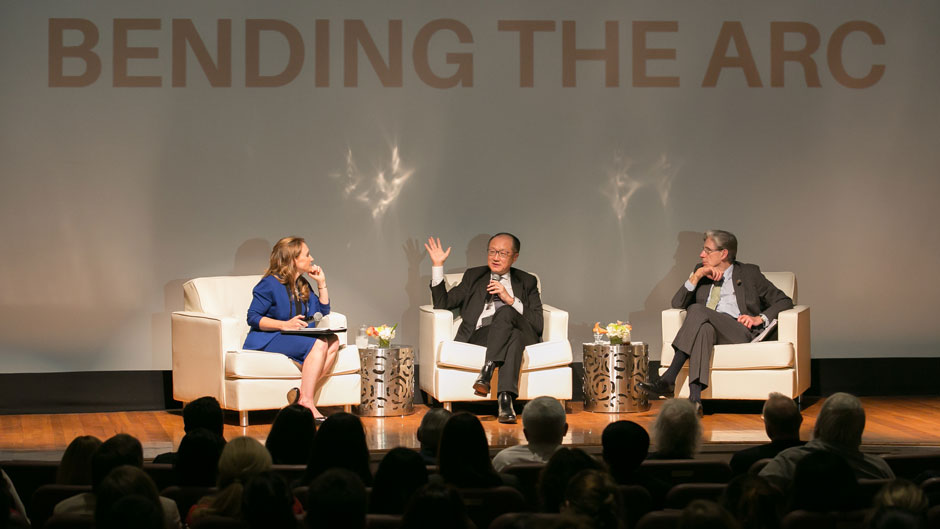Before the lights dimmed and the curtains parted, Dr. Jim Yong Kim, president of the World Bank Group, warned students about the “great danger” of watching a film about how he and other founders of Partners In Health fought the prevailing wisdom and brought health care to some of the world’s poor, first in Haiti, then Peru, then Rwanda, and today in 10 countries on four continents.
You might leave here, Kim said from the Cosford Cinema stage he shared Wednesday night with UM President Julio Frenk and Felicia Marie Knaul, director of the University’s Institute for Advanced Study of the Americas, thinking the naysayers in Bending the Arc were bad people for believing it too cost-prohibitive, unrealistic and unsustainable to treat millions of people infected with multi-drug resistant tuberculosis (MDR-TB), HIV/AIDs, or other infectious diseases.
But that would be the wrong conclusion, Kim said during a riveting Q&A with two of the world’s leading global health thinkers. Moderated by Knaul, the Q&A preceded UM’s screening of the acclaimed documentary that—through photographs, historic TV footage and contemporary interviews with thriving patients long ago given up for dead—chronicles how Kim and fellow Harvard-trained physician and anthropologist Paul Farmer were compelled by their conviction that every life matters to challenge skepticism.
“You’ll see a scene where the head of the U.S. Agency for International Development says that it’s impossible to provide HIV treatment in Africa because Africans have no conception of time. They know morning, they know midday and they know dark of night, but they don’t have watches. How can they take five medications a day?’’ Kim said. “But the most important thing to remember is the guy…is a good man. He’s a decent, caring guy who was making an argument that seems ridiculous, and it was, but he was simply representing the overwhelming view of the entire global health community.”
As anthropology students at Harvard, Kim said he and Farmer, who was unable to attend the screening, forged their own views of global health from “a simple notion” borrowed from liberation theology to make a preferential option for the poor. “Which means,” he explained, “that you are not against anyone else, but your preference will always be for the poor.”
He repeatedly challenged students in the audience to forge their own convictions, and let them, not the perceived wisdom of the day, guide their own lives toward a future they won’t regret.
“The question you should ask yourself is: What is your foundation that you are taking into any discussion?” Kim said. “Because if your foundation is, ‘I am an economist and I am only going to make decisions that are cost-effective,’ then you walk into a situation and end up making decisions that 15 years later people will say, ‘How can they have done that? How can they have told 25 million Africans (infected with HIV) that they are just going to die? How can they have told all these millions of people with MDR-TB that they should die quickly, as quickly as possible, please, because we don’t want you to infect anyone else?’’’
Frenk, who as health minister of Mexico brought universal health coverage to millions of uninsured Mexicans, noted the ironic lesson embedded in Partners In Health’s successful training—and employment—of community health workers who deliver health care, along with compassion, to remote outposts. The same moral compass that would later guide Kim, as director of the World Health Organization’s HIV/AIDS program, to expand lifesaving antiretroviral medication in Africa and other developing countries, also increased economic prosperity.
“It started initially as a moral argument, but eventually,” Frenk said, “it became clear that the main drag on the economic growth of Africa was the AIDS epidemic, and if you wanted to do one thing to promote growth in Africa, dealing with HIV/AIDS was the thing to do.”
Given his non-financial background, Kim’s nomination by President Obama in 2012 as president of the World Bank was considered a stunning choice. But, as Frenk noted, Kim, the former president of Dartmouth College, brought a fresh and needed perspective to an institution that was founded to end extreme poverty and build shared prosperity.
Kim credited AIDS activists in the U.S., who were outraged that the world’s poor didn’t have the same access to the antiretroviral drugs that kept them alive, with “embarrassing” world leaders into action. Borrowing a page from their book, he promised that the World Bank’s recently announced plan to measure the Human Capital Stock Index of the world’s 190 nations by ranking their investments in health and education would unleash “pandemonium” that will finally benefit the poorest people.
“Not only on infection diseases, not just vaccines, but on non-communicable diseases and…for people at the end stage of their lives who have cancer,” Kim said, citing among the biggest health inequalities the developing world’s terminally ill who are dying in excruciating pain. “We know that. We can fix it. But the way to fix it is to make it absolutely irresistible for heads of state and ministers of finance to invest in poor people’s health.”
And that was a message of hope for Knaul, an international health economist who chaired the recent Lancet Commission report on the lack of access to palliative care and pain relief for the world’s poor.
“We can dream of a future where a child in Africa who gets acute lymphoblastic leukemia has the same probability of survival as a child in Canada,” she said. “We can dream of a future where no person has to live and die in unnecessary and treatable pain.”

Dreaming of the role they’ll play in their own futures, students wearing orange Partners In Health T-shirts, timed the screening and Kim’s visit to officially launch what they hope will be a UM chapter of Partners In Health Exchange, a grass roots organization that advocates for access to health care. Knaul will advise the group, which is headed by Calvin Antonetty, a former Navy medic who watched Bending the Arc for the third time—“crying in the same places and laughing at the same jokes for the third time.”
Among the many leaving the theatre teary-eyed after the screening, music student Jessica Hamorsky expressed a sentiment that was widely felt.
“Honestly,” she said, “I am a different person than when I went in. That was one of the most inspiring films I’ve seen, and Dr. Kim is one of the most amazing people I’ve ever heard. It makes me want to re-evaluate my life.’’

